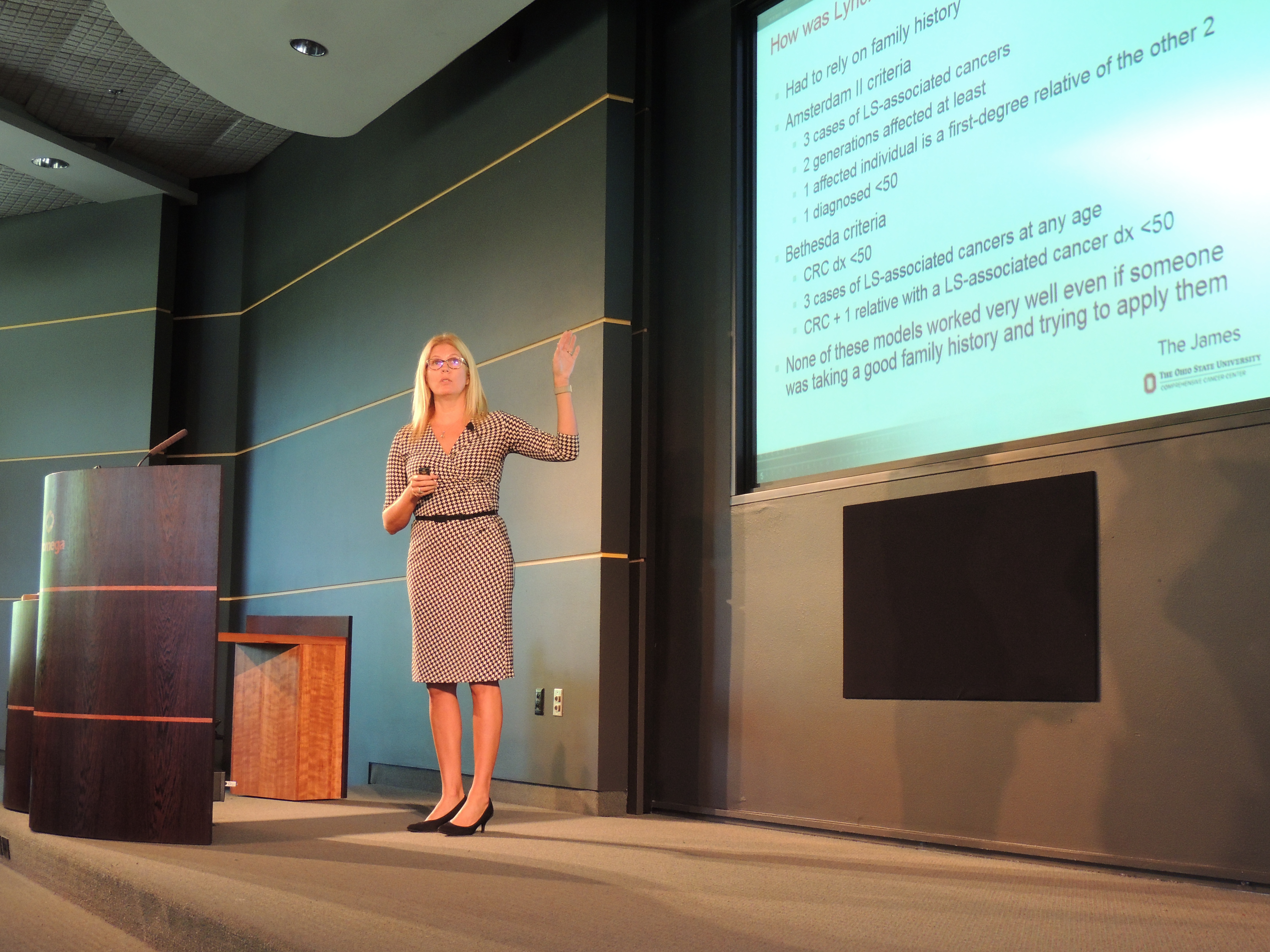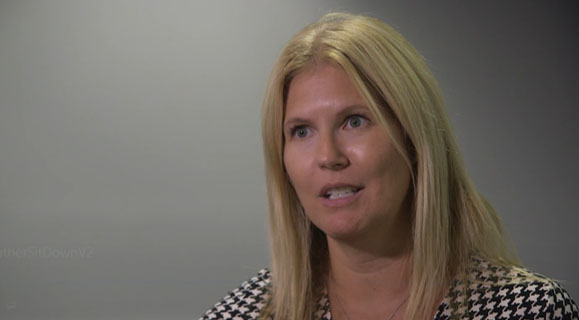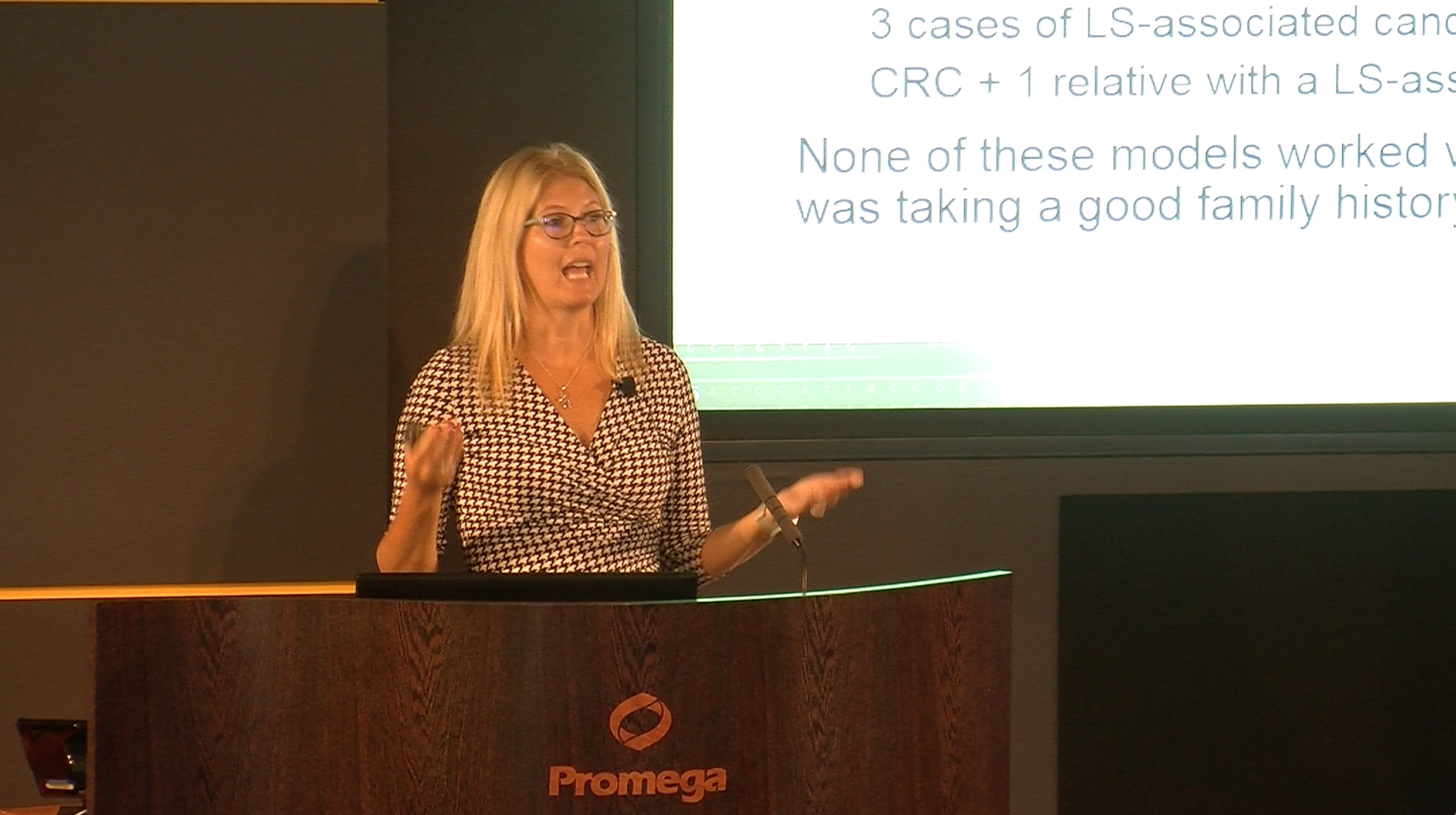Dreaming of Universal Tumor Screening
Cancer genetics expert Heather Hampel wants every new colorectal tumor to be tested for Lynch Syndrome
By Jordan Villanueva • August 13, 2018
Heather Hampel, MS, LGC, leads difficult conversations for a living. As a genetic counselor, she works with many patients who have recently been diagnosed with a cancer syndrome or hereditary predisposition to cancer.
For Heather, one of the biggest challenges is explaining complex information about genetics and DNA to a specific patient in language that they will understand.
“Your patient might not have a high school education, or might have a PhD,” Heather says. “You have to explain what’s going on – DNA mismatch repair, autosomal dominant inheritance – in a way they’ll understand. It’s almost like speaking several different languages.”
Heather is a world leader in cancer genetics and has devoted most of her career to research on Lynch Syndrome detection. She is currently the Associate Director of the Division of Human Genetics at The Ohio State University Comprehensive Cancer Center. On July 31, we hosted Heather and her colleagues Paul Goodfellow, Ph.D., and Rachel Pearlman, MS, LGC, for a day of learning and lively conversations about microsatellite instability (MSI), Lynch Syndrome and the future of cancer genetic testing.
“I was so excited to have Heather on campus because it helped put all the work we are doing on MSI into context,” says Promega Director of Clinical Diagnostics Heather Tomlinson. “Her real-world experience with MSI testing…was inspiring.”
A Passion for Cancer Genetics
Heather has been working in cancer genetics as a counselor and researcher for over twenty years. She’s published many papers on Lynch Syndrome cascade testing, including MSI, immunohistochemistry (IHC) and germline sequencing. Before Heather became the Lynch Syndrome expert that she is today, Heather started her career working with BRCA1 and BRCA2.
“I started as a cancer genetic counselor at Memorial Sloan Kettering Cancer Center six months after BRCA1 was discovered and six months before BRCA2,” Heather says. “We happened to have a large Ashkenazi Jewish population, so I was involved in some of the early studies to find the founder mutations that are common in Jewish individuals, which kind of got me interested in doing research in cancer genetics.”
This was the mid-90s, when cancer genetics was starting to attract attention. The Human Genome Project had been underway for several years, and recent advances such as the discovery of microsatellite instability had researchers taking a closer look at genetic drivers of tumorigenesis.
“There were only a few centers in the US doing cancer genetics at the time, so it was really an exciting time to be involved.”

Heather Hampel delivered a presentation on Lynch Syndrome detection which included data from her citywide and statewide initiatives for universal tumor screening.
In 1997, Heather moved from Memorial Sloan Kettering back to her alma mater, The Ohio State University. She arrived at the same time as Albert de la Chapelle, the eminent Finnish geneticist almost synonymous with MSI and Lynch Syndrome. In the following years, de la Chapelle became a mentor and advisor who guided Heather’s work in cancer genetics. It was at this time when her focus shifted from BRCA1/2 to Lynch Syndrome.
“Lynch is cool because you have tumor tests you can use to identify the patients that are more likely to have it, which you don’t have with BRCA1 and 2,” Heather says. “And you have surveillance that really works — you don’t have to have prophylactic surgeries. Lynch hasn’t gotten a lot of attention historically, so it was a wide-open space at the time.”
Lynch Syndrome is an autosomal dominant disorder that involves a germline mutation to a DNA mismatch repair (MMR) gene (MLH1, MSH1, MSH6 or PMS2). This hereditary syndrome drastically increases an individual’s chances of developing certain cancers, including colorectal, endometrial and gastrointestinal cancers. These cancers are usually diagnosed at a young age, and they show high microsatellite instability and a dense lymphocyte infiltrate. One in 279 individuals in the United States has Lynch Syndrome, but according to Heather, around 95% of them are completely unaware. Since most Lynch-associated cancers are highly preventable and treatable, awareness could be life-saving for many of these people.
“Think about newborn screening. The most common condition we find in newborn screening is sickle cell anemia,” Heather says. According to the CDC, sickle cell disease occurs in approximately 1/365 black or African-American births. “These are things we think are common enough that we screen every single baby for them. Now compare that to 1 in about 33 patients with colorectal cancer having Lynch Syndrome.”
Heather’s goal is to see all colorectal and endometrial cancers screened for Lynch Syndrome at the time of diagnosis. She says that this information could inform prognosis and treatment, and might be invaluable for the patient’s family members. For example, in one of Heather’s initiatives, she tested 297 relatives of subjects found to have Lynch Syndrome. Of those, 130 were Lynch-positive. Armed with their genetic information, those 130 people now have the chance to seek guidance from genetic counselors and determine their best options for prevention and surveillance.
Spreading the Word
The first guidelines for Lynch Syndrome diagnosis were all based on family history. Generally, these criteria looked for a certain number of Lynch-associated cancers in a patient’s close family and accounted for each individual’s age at diagnosis. However, Heather’s research clearly demonstrates the practical inadequacy of these guidelines. In a citywide initiative based in Columbus, Ohio, Heather’s group found 44 colorectal cancer patients with Lynch Syndrome, a quarter of whom did not meet the Amsterdam or Bethesda criteria. The 14 Lynch-positive endometrial cancer patients showed an even larger discrepancy: 65% did not meet either set of criteria. In both cohorts, the average age was 51.4 at diagnosis, with over half of the patients over age 50.

Heather recommends cascade testing for all newly diagnosed colorectal and endometrial cancers. This starts with either MSI or detection of the MMR proteins by IHC. If a patient is MSI-high or is missing one of the MMR proteins, the next test will be to check for methylation on the MLH1 promoter. This is a common cause of mismatch repair deficiency. If no methylation is found, the final step will be germline sequencing of the four MMR genes to determine whether the patient has Lynch Syndrome or whether the deficiency is caused by double somatic mutations. By the end of the cascade, around 4% of the original patients will be notified that they are positive for Lynch Syndrome. These patients are then referred to genetic counselors like Heather, who can explain the significance of their status and walk them through potential next steps.
“There are so many people we can miss if we sit around waiting for them to get tested. If more people were getting access to testing, there would be plenty of positives to keep us busy."
A lot of Heather’s work has been encouraging hospitals to screen every newly diagnosed Lynch-associated cancer for Lynch Syndrome. She spent much of the 2000s leading a citywide initiative in Columbus, OH, to get every new colorectal cancer screened at diagnosis. This was particularly difficult since it required the other hospitals in the city to collaborate with Heather’s institution, one of their biggest competitors. Nonetheless, the citywide initiative was successful and resulted in thousands of patients receiving testing.
Following the citywide initiative, Heather expanded her target to the entire state of Ohio. The Ohio Colon Cancer Prevention Initiative (OCCPI) includes fifty hospitals across the state, each one committing to screen every single newly diagnosed colorectal cancer (Heather says it was no small feat to get the same proposal through fifty Institutional Review Boards). These hospitals are all sending their samples to Heather’s group at The Ohio State Comprehensive Cancer Center, where they undergo MSI testing.
Empowering Patients to Find the Answers
Outside of Ohio, Heather’s goal of universal screening is farther from reality. The most recent study available found that only 71% of NCI-designated comprehensive cancer centers were regularly performing this testing, and the proportion of community cancer hospitals might be as low as 15%. This means the vast majority of the 150,000+ patients who will be diagnosed with a Lynch-associated cancer this year will not be screened.
“I haven’t totally given up on policy,” Heather says. “If you could make a system-level change, it would be more effective. But in the United States, we just can’t. It would take laws in 50 different states.”
Heather hopes that recent trends in patient self-advocacy will increase the number of patients being tested. In 2015, a landmark study found that MSI status was a strong indicator of how a patient will respond to immunotherapy. MSI is one of the key features of Lynch tumors, so all patients with Lynch Syndrome could benefit from immunotherapeutics. Heather says that for some of them, this could be life-saving.
“For some of them, it’s nothing short of the Lazarus effect. The patient is going to insist that they have it. A lot of nonprofit groups are educating patients on biomarkers and working to inform people about these discoveries. When the patient asks their MSI status, if the doctor says they don’t know or the test hasn’t been done, that’s not going to be acceptable.” Heather hopes that this pressure from the patient side will gradually shift the norms of clinical practice. “It’s hard to do a patient at a time, but I think the results could get that specific institution to start doing it, and then gradually we’ll get them all.”
Heather’s work has also been shaped by the advent of direct-to-consumer (DTC) genetic testing. According to the CDC, over 12 million people in the United States have been tested by a consumer genetics company, and the rate is still increasing. Heather says that many “old-school” genetic counselors are disturbed by the trend, insisting that individuals should receive pre-test counseling from a licensed counselor before diving into the tests themselves. She’s less worried, saying that it’s never a bad thing for more people to have access to their own genetic information.
“We think we’ll be doing more post-test counseling in the future, and we don’t mind it. It’s very productive when someone comes to you with a positive result and you can teach them what that means and how they need to do surveillance.”
Unfortunately, not every individual who receives a positive result from a DTC test will seek genetic counseling. In those cases, the test results can do little to help a patient who may not fully understand what they mean and what the next steps should be. Nonetheless, Heather says that DTC tests are a great way for genetic counselors to have more conversations with individuals who haven’t yet been diagnosed with a cancer.
“There are so many people we can miss if we sit around waiting for them to get tested. If more people were getting access to testing, there would be plenty of positives to keep us busy. It’s just better in general to get more people tested.”
Watch Heather's Full Presentation
